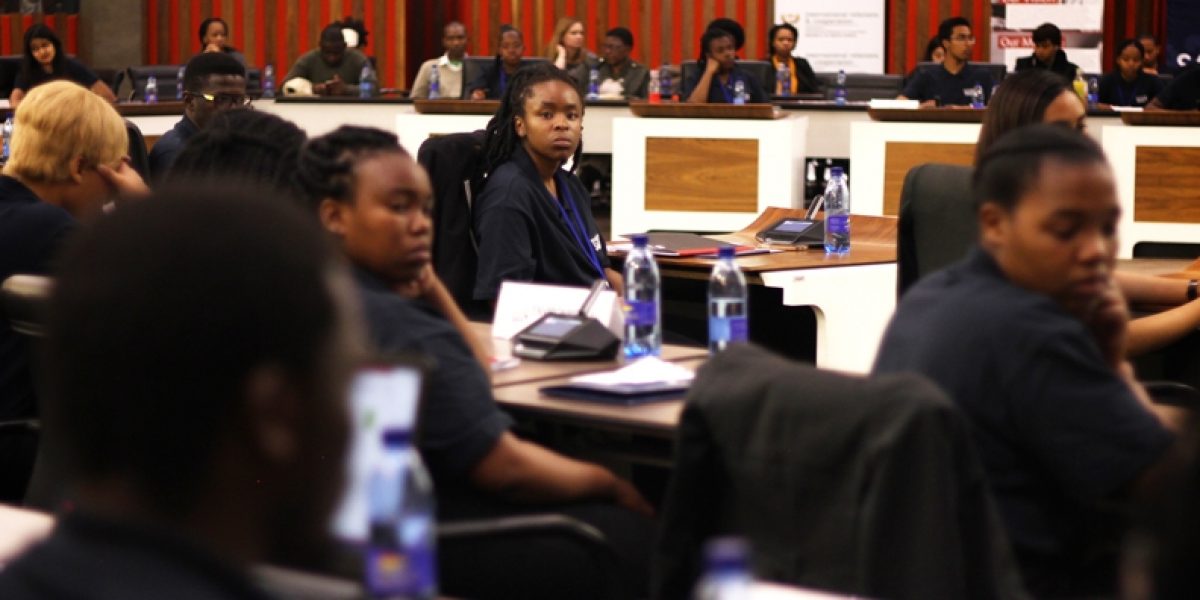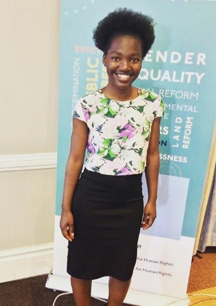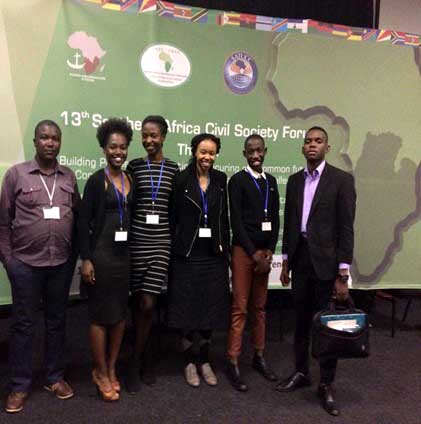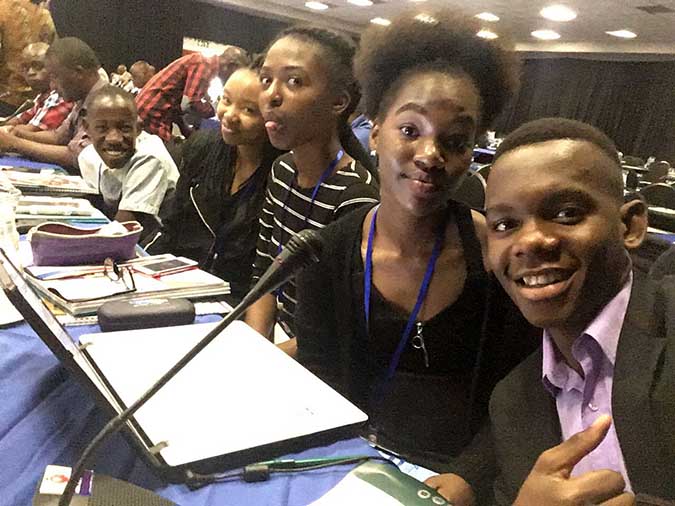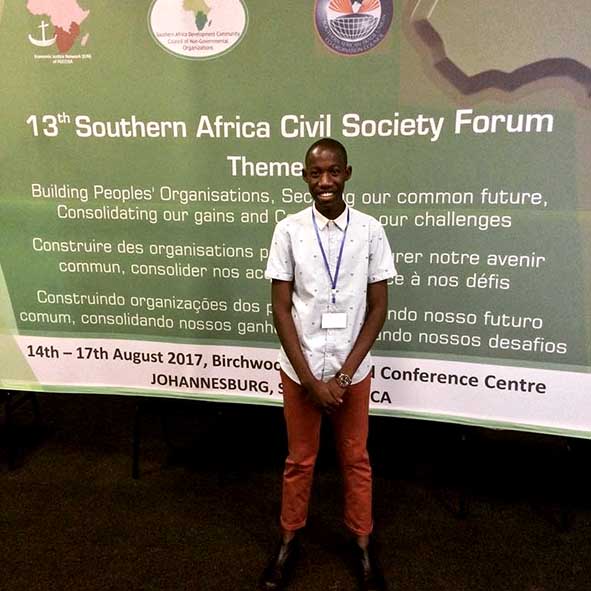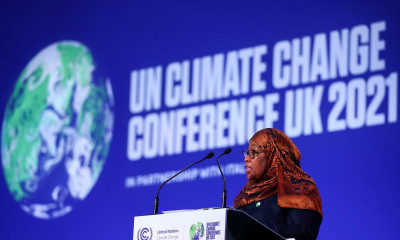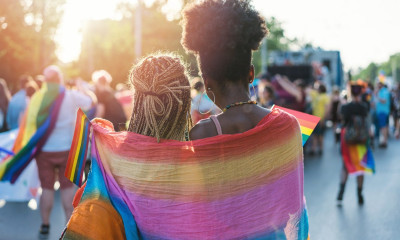We need full youth participation, not just youth involvement
by Simphiwe Mahlangu
Civil society is defined as a ‘community of citizens linked by common interests and collective activity.’ This was evident at the 13th SADC Civil Society Forum from day one.
The Forum serves as a platform for civil society organisations from all over the region to meet and consolidate their stance, which is then presented as a declaration to the SADC secretariat. The theme for this year’s forum was ‘Building People’s Organisations, Securing Our Common Future, Consolidating Our Gains and Confronting Our Challenges’.
The four-day Forum addressed a wide number of issues faced by civil society, reflected in the many different organisations represented. As a young person who has grown up in the SADC region, it was quite refreshing to learn about all of the interest groups and organisations that do the groundwork behind the making of policies.
Day one of the summit involved getting acquainted with the various organisations and outlining why we were all gathered there. Day two was negotiation; efforts presented here were expected to result in a final declaration. Groups were split into thematic cafés, and later commissions, to refine the issues outlined: the protection of communities in extraction environments, statelessness, the continental free trade area, and so on. Day three was about drafting the final document, making sure all of the areas presented were reflected, and on day four there was a meeting at the Constitutional Court to present the document.
The youth experience in these spaces is often misunderstood, primarily because it is considered that young people do not want to be involved. One of my fellow delegates, Assandra Oguntimrin, was asked to present on behalf of the Child Rights Network for Southern Africa. Her presentation was lauded by audiences as informative and eye-opening. It really demonstrated just how crucial youth participation really is.
The entire experience reminded me just how important it was that these platforms are opened up to young people. I learned so much about the important role that non-state actors play in the international arena and the need for their development. I had a chance to better my negotiation and communication skills, and I heard about the good work that NGOs in the region are doing to encourage development.
A lot of the issues covered at the Forum were discussed in our 2017 SAIIA Young Leaders Declaration. This shows the need for true youth participation – as opposed to just youth involvement – in civil society spaces and development conversations and decisions. It is important that civil society groups also plan development initiatives that will incorporate the development of youth too. This would mean that they have youth constituencies in each setting which affects youth, even in discussions surround the protection of older persons.
We need a Child Rights Protocol for Southern Africa
By Nyasha Simon Dick
Children and young people’s participation has been minimal in the SADC Civil Society Forum over the past years. That changed this year, with the participation of six vibrant delegates from the SAIIA Young Leaders Conference 2017.
I was one of these delegates, and our purpose was to advance the agenda of the 2017 SAIIA Young Leaders Declaration, with special emphasis on promoting the participation of young people in policy formulation and implementation.
Armed with Declaration, we participated in the Forum’s plenary sessions, and – more actively – in the separate thematic cafes that related directly to issues agreed upon the Declaration.
Statelessness among children in the SADC Region was discussed in the pre-forum events, and we managed to highlight the need for urgent policy re-alignment to ensure that no child and young person goes without a nationality, as this significantly affects the enjoyment of other rights. In the resolution of the meeting we called upon civil society organisations (CSOs) to strengthen initiatives to further protect children and young people at risk of statelessness. Youth participation in the statelessness discourse was put on the spotlight, and all CSOs in attendance agreed that it is imperative for young people to take part in influencing the statelessness discourse.
Investments in education have long failed to meet the agreed target of 20% of national budgets, enshrined in the Incheon Framework of Action, with sub-Saharan Africa at present averaging just 16.6%. These numbers have negatively affected the quality of education for children and young people in Africa, and action must be taken to ensure that governments recommit their expenditure to education.
Young people participating in the ‘tax justice thematic café’ implored the forum to speak with one voice and continue advocating for governments in Southern Africa to allocate more money to education for children and young people. The concept of safe schools was deliberated upon, with us calling upon our governments, private sector and CSOs to invest more in providing education that is responsive to the needs of every child, including children and young people living with disabilities, girls and young women, and many other special cases that exist in the schooling environment.
Young people have not been participating in in the allocation of resources at local and national level, yet they constitute the largest demographic on the continent. This was one of the sentiments that came out in the discussion on the Commission on Popular Participation and the Rule of Law, as we deliberated on how the SADC region can harness the potential of the ‘youth demographic dividend’. A lack of spaces and forums, and a difficulty engaging at policy level, has disempowered youth from taking charge of their destiny and shaping their future. The upsurge of fake news and the growing number of users of social media and the internet was also put under the spotlight, to assess how it heavily affects the flow of accurate information in the region.
We endorsed the message that there is dire need to invest in technology to protect children and young people on the internet. Access to justice and promotion of the rule of law has been curtailed by lack of adequate information, corruption and the threats by African states to pull out of the International Criminal Court, and these were highlighted as some of the major impediments to full realisation and respect of human rights in the region.
Our major achievement was that we managed to speak with one voice on the urgent need for a SADC Child Rights Protocol, and this was included in the outcomes for further engagement with the SADC Council of Ministers. This legally-binding document will be instrumental in ensuring that member states uphold and promote child rights in their countries.
We resolved to continue pushing and engaging with the SADC Secretariat until the Protocol is agreed upon and ratified.
There is still so much more to do to increase youth involvement
By Rachel Chizungu
The thought of representing young people across Southern African states at the Southern African Civil Society Forum was daunting, but at the same time exciting.
The Forum is made up of different civil society organisations, non-governmental organisations and churches in the region. Just arriving at the venue made me question the work I’ve done so far as a youth, and realise that there is still so much more to do in order to increase youth involvement in South Africa and Southern African countries as a whole.
The pre-event on the first day was on childhood statelessness in Southern Africa. Statelessness is when a person is not recognised as a citizen in their country of origin or any other state, and does not have formal identification documentations. This is a tremendous issue that affects the livelihood of children and the youth, because it infringes upon their basic human rights, such as the right to education, healthcare, social welfare and protection.
Lawyers for Human Rights conducted the discussions and presentations on statelessness. Every organization had a different approach on how to end or reduce statelessness. As the youth delegation we recommended that government partners with NGOs, for data safe space and standardised data collection tools and reporting. In addition, NGOs should advocate for increasing efficiency within departments working on the issuing of documentation. Moreover, they should focus on communicating the laws to lower department levels, such as the Department of Home Affairs.
We officially started with the Civil Society Forum on the 14th of August. I must say, this is when we really saw how determined everyone was to push for their own agenda. Being a new participant made me more attentive to the topics being discussed, before raising my own ideas from the Young Leaders Declaration we compiled at the SAIIA Young Leaders Conference last month.
There were different panel discussions set for the day, opening with issues facing women, the youth, social protection and vulnerable populations. We as the youth delegation decided to raise the topics of youth unemployment, children’s rights, youth participation and policymaking in government.
On the second day of the Forum, we had the opportunity to decide on the different thematic cafés we wished to attend. Looking back, I was a bit unsure of choice to attend the thematic café on, “Can communities benefit from mining?” I knew that I had an idea of environmental issues, but I felt like I did not have sufficient background information regarding mining. However, I knew that youth participation was needed for this thematic café, due to the exploitation of children in the mining industry.
I decided to bring two suggestions regarding young people in the mining industry across the SADC region. The first resolution was for NGOs to advocate for governments to establish a policy that sustains the rights of young people in mining. Secondly, civil society and government should provide basic skills for the youth, in order for them to be able to compete in the mining industry.
Overall, I learnt a lot from the other organizations in their different spheres. There is still more that needs to be done regarding youth participation, but in the meantime we carry on advocating for the youth, and creating contacts that may assist us in reaching our long-term goals. I believe that we will soon accomplish our mission as young leaders.
Those who push hardest are most likely to have their issues addressed
By Enerst Mwanza
After traveling to the Forum from Livingstone, the first event I attended was an informative pre-event on statelessness. This workshop, chaired by Lawyers for Human Rights and the SADC Network on Statelessness, reviewed the current situation and the need for participants to influence their individual governments.
This day encouraged some much-needed participation, and at the end we had drafts of resolutions encompassing all sectors of society. We also had presentations from the Scalabrini Centre of Cape Town, who provided solutions for the issue of unaccompanied children, and UNHCR /UNICEF, who introduced the Coalition on Every Child’s Right to a Nationality. There was also a presentation from Maxim Murungweni of the Zimbabwe National Council for Welfare of Children on the state of affairs in Zimbabwe.
After lunch, we were given a presentation from Focus Development Madagascar on gender equality in nationality law. This showed that things had improved around gender – as women can now pass their nationality to their children – but that more still needs to be done.
The actual opening ceremony of the Forum followed on 14 August. The program began with opening remarks from the chair, Austin Muneku of the Southern African Trade Union Coordination Council (SATUCC). Afterwards, we listened to reflections from the Apex Alliance on last year’s forum, delivered by Rev. Dr Kenneth Mtata of FOCCISA, Mr Jules Hoareau of the SADC Council of Non-Governmental Organizations and Mr. Gadzani Mhotsha of SATUCC.
We then moved on to a moderated Q&A session, to discuss key challenges facing civil societies, providing insights on areas for strengthening and coordination, and issues of resource mobilisation and consolidating gains. The discussants were Austin Muneku from SATUCC, Boichoko Ditlhake from SADC-CNGO and Malcolm Damon from FOCCISA.
Though there was little real input in the first half of the day, the second half allowed a lot more engagement. We as young people took advantage of this to talk about issues that affect children and youths. As the representatives of the 2017 Young Leaders Conference, we gave a presentation during the regional development session on the need for a child’s rights protocol.
Other issues discussed were disability (by the Southern Africa Federation of the Disabled), the elderly (by Help Age International), wider youth issues (by the Southern African Youth Movement) and gender and development (by the SADC Gender Protocol Alliance).
This session was the most informative of the day, as the information was digestible and we could chip in and emphasise the need for our issues to be heard. We ended our day with a presentation from SANGONET on harnessing the technological revolution to transform civil societies in SADC.
I personally consider the second day of the forum the most important, as we were divided into thematic cafés according to areas of interest. This day also gave us those who had been silent on the first day an opportunity to have our issues tabled, in front of a smaller and more interested audience.
There were 8 thematic cafés, and I attended the one on “education now,” which not only looked at the problem but proposed positive practical ways to generate funds for the solution. Presentations were made using brand-new evidence and analyses on education financing and tax justice from across the SADC region. The thematic café also talked about the privatisation of the education sector. A special opportunity was also given to young people from Activista to talk about issues affecting youth in the region, and afterwards we were asked to come up with a resolution to be considered in the final document.
I, along with two other delegates, managed to convince our café to support the development of a SADC child’s rights protocol.
After lunch we divided into commissions to discuss other equally important issues, though they had little or no connectivity to children. In my commission, I was given a platform to present on promoting youth participation in key areas of health protection, for inclusion in the SADC Harmonised Regional Standard on Health in the Extractive Sector.
The experience reminded me that there are a lot of issues that face the region, and those who push hardest are most likely to have their issues addressed.
I am proud to say I attended the forum, because my voice was heard in a meaningful way. I took part in the shaping of the future of the SADC region.

